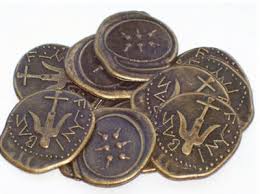Deuteronomy 31:81NIV New International Version Translations
8 The Lord himself goes before you and will be with you; he will never leave you nor forsake you. Do not be afraid; do not be discouraged.
 Background
Background
Moses was preparing the Israelites for life in the country that God had promised to their ancestors. He reminded them about the way that God had led them in the past. God brought the Israelites out of Egypt almost 40 years before. Now Moses and the Israelites were in the plains of Moab. They were in the area where the River Jordan flowed into the Dead Sea (Deuteronomy 1:5). The time had come for them to go over the river. Soon they would start to occupy Canaan, the country west of the river.
In this chapter Moses has finished his sermon to his people. Moses encourages both the people who were now ready to enter Canaan (v. 1-6), and Joshua who was to lead them (v. 7, v. 8, v. 23). He is reminding them to keep all of the things he has taught them after his death, to live by the book of the law which was written by him through God’s inspiration, delivered by him into the custody of the priests (v. 9, and 24-27), and ordered to be publicly read every seventh year (v. 10-13).
By a song God orders Moses to prepare for the people for their instruction and warnings:
- God calls Moses and Joshua to the door of the tabernacle (v. 14, v. 15).
- God foretells the abandonment of Israel’s faith over process of time, and the judgments they would thereby bring upon themselves (v. 16-18).
- God prescribes the following song to be a witness against them (v. 19-21).
- Moses writes it down (v. 22) and delivers it to Israel, with the warning that he had received it from the Lord (v. 28, etc.).
Moses was aware that he would soon die. Because of that fact, he again encouraged the people to trust in God. And he wanted to be sure that they would accept Joshua as their next leader. Moses spoke to all the people. He told them that he was 120 years old. He could not continue to lead them. He was too old but that was not the only reason. The Israelites would soon cross the River Jordan into the country that God had promised to them.
The LORD had said that he would not allow Moses to go across the river. Some years before, the Israelites complained to Moses that there was no water. The LORD had told Moses to take his special stick and to speak to the rock. Moses was so angry that he hit the rock. Because of that, the LORD said that Moses could not lead the people into the country (Deuteronomy 3:23-29).
Yes, Moses was old but that was not the reason for his death (Deuteronomy 34:7). He would die because the time for Israel to go into Canaan had come and Moses would not enter that country. Moses would not cross the River Jordan. However, he encouraged the Israelites by the promise that the LORD would cross over ahead of them. God would destroy the seven nations that lived in the country (Joshua 3:10). The Israelites would possess their countries, their towns and their properties.
Items for Discussion
- Do you think God’s Judgment on Moses, to never let him see the promised land was a fair thing? It just seemed like he only made one mistake.
- How does society sort out “warning messages?” In other words, when we are told that something ominous will happen, how do people respond?
- Why do you think that after all God did under Moses direction and all that was about to happen under Joshua’s direction, the Israelites were going to still abandon the Law of Moses?
- So what can we learn about our God from this story?
- For discussion, does God care more about the big things or the small things?
- Or are the small things really the big things?
Luke 21:1-4
1 As Jesus looked up, he saw the rich putting their gifts into the temple treasury. 2 He also saw a poor widow put in two very small copper coins. 3 “Truly I tell you,” he said, “this poor widow has put in more than all the others. 4 All these people gave their gifts out of their wealth; but she out of her poverty put in all she had to live on.”
 Background
Background
In this chapter we find that Christ notices something all others ignored, but He approved, the two mites a poor widow gives to the treasury. The Gospels of Mark and Luke both tell this story. She didn’t give much—just two mites—or did she? The story is often called the story of the widow’s mite. It begins with Jesus sitting with His disciples near the temple treasury watching people depositing money into the offering receptacles. The court of women held thirteen such receptacles, and people could cast their money in as they walked by. Jesus watched as the rich were contributing large sums of money, but then along came a widow with two small coins in her hand. Called “mites,” these were the smallest denomination of coins. The widow put her coins into the box, and Jesus called His disciples to Him and pointed out her action: “Truly I tell you, this poor widow has put more into the treasury than all the others. They all gave out of their wealth; but she, out of her poverty, put in everything—all she had to live on” (Mark 12:43–44; cf. Luke 21:1–4).
There are several things that the story of the widow’s mite teaches us.
First, God sees what man overlooks. The big gifts in the temple were surely noticed by people; that’s probably what the disciples were watching. But Jesus saw what no one else did: He saw the humble gift of a poor widow.
Second, God’s evaluation is different from man’s. The widow’s two mites added up to a penny, according to man’s tabulation. But Jesus said that she had given more than anyone else that day (Mark 12:43). How could this be, when “many rich people threw in large amounts” (Mark 12:41)? The difference is one of proportion. The rich were giving large sums, but they still retained their fortunes; the widow “put in everything—all she had to live on” (Mark 12:42). Hers was a true sacrifice; the rich had not begun to give to the level of her sacrifice.
Third, God commends giving in faith. Here was a woman in need of receiving charity, yet she had a heart to give. Even though the amount was negligible—what could a widow’s mite buy?—she gave it in faith that God could use it.
What you may also find interesting is that, just before Jesus commented on the widow’s mite, He commented on the scribes “They devour widows’ houses and for a show make lengthy prayers. These men will be punished most severely.” (Mark 12:40). The religious officials of the day, instead of helping the widows in need, were perfectly content to rob them of their livelihood and inheritance. The system was corrupt, and the darkness of the scribes’ greed makes the widow’s sacrifice stand out even more.
Items for Discussion
- When was the last time you went looking for change in your couch or under your car seat?
- Do you pick up a penny if you see it on the ground?
- The examples above are of insignificant amounts of money in today’s society. So how much money is “significant to you?”
- Do you believe that generosity is growing in our world or fleeting?
- What would you define as an appropriate amount or circumstances to satisfy the spirit of generosity that Jesus is talking about for the following:
- Your Time
- Your Talent
- Your Treasure
- Your Testimony
Discussion Challenge
- How would you encourage those around us to be “faithful givers?”
- How would you describe the following, “People look for the big things in life, God looks for the small things?”
- 1NIV New International Version Translations
